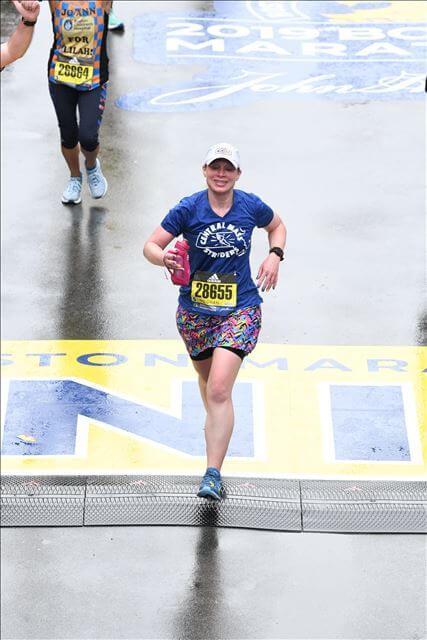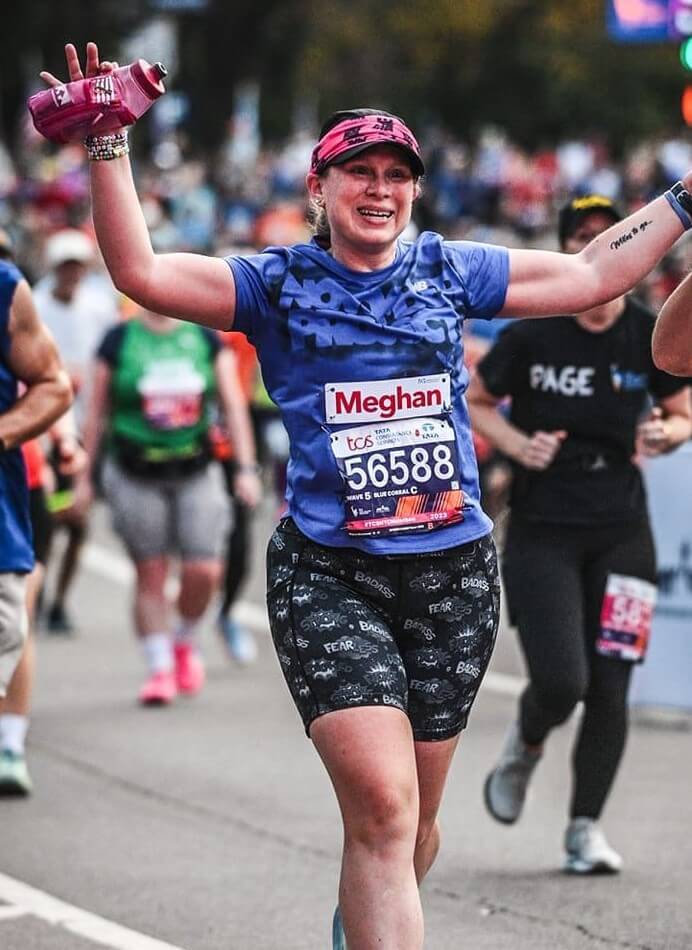When Meghan MacDonald visited her primary care provider in the fall of 2022 to get a lump in her breast examined, they confirmed her suspicion that it was just an inflamed cyst. Relieved, MacDonald began a course of antibiotics, but when the lump didn’t go away, her doctor ordered a mammogram, and when the results were concerning, referred her to Dana-Farber.
She was confused by this sudden change of plan, and meeting with Natalie Sinclair, MD, at Dana-Farber Brigham Cancer Center – Foxborough for the first time, she learned that she was being evaluated for cancer. But nothing prepared her for the jarring shock of the biopsy results. Just as the new year began to approach, Sinclair informed MacDonald that the supposed cyst was late-stage and metastatic breast cancer.
MacDonald faced her diagnosis with courage. The longtime social worker who treats and supports patients facing mental illness and addiction has faced stressful situations before, and she knew where to turn to manage it: her running shoes.

The road to New York
MacDonald’s running began in 2007 as an easy way to exercise, but she soon found her way into a running community full of friendly and supportive people. She began to take the sport more seriously, entering races including the Boston Marathon and sometimes running multiple marathons in a year.
In 2022, MacDonald set her feet in the direction of a goal that many runners aspire to, the New York City Marathon. After losing the lottery eight times, MacDonald pursued a different entry method by running a virtual marathon in the fall of 2022 to gain guaranteed entry to the 2023 race. It was shortly after completing the virtual race that MacDonald received her diagnosis in December.
But she wasn’t going to let this hurdle slow her down.
“Meghan just took this diagnosis head on,” Sinclair remembers. “She was so calm and graceful in the face of that stress.”
Despite some initial breast and joint pain, MacDonald continued to run. She was buoyed by the support of her running community. Together, they raised thousands of dollars for breast cancer research through a Facebook fundraiser.
Because MacDonald’s cancer was estrogen receptor-positive (ER+) and HER2-negative, Sinclair began treatment with an aromatase inhibitor and a CDK 4/6 inhibitor. These drugs work together to keep breast cancers like MacDonald’s in check. The aromatase inhibitor slows production of estrogen, which spurs growth in ER+ cancers. Meanwhile, the CDK 4/6 inhibitor targets two proteins that are involved in the division and multiplication of cancer cells, interrupting the process.
Within six months, MacDonald’s symptoms and side effects faded away. Her cancer was stable.
“I could lead my normal life,” she says. “And more importantly, I could run pain-free.”
All she had to do next was run the race.
“I’m in awe of Meghan’s resilience,” Sinclair says. “It’s so important for patients to have goals and hope.”
With a running pal, MacDonald hopped on a train to New York City less than a year after she began treatment. They hit the town, visiting museums, bars, and enjoying a nice Italian dinner, and the next day was the main event. In her beloved Asics, MacDonald ran the race, hugging friends who had come to spectate along the way and crossing the finish line holding hands with her best friend.
“It was awesome,” she says, smiling.

MacDonald’s next chapter
With the crowning accomplishment behind her, MacDonald did not rest. There are more races in her future, and she also recently joined a clinical trial at Dana-Farber called the SERENA 6 trial. It aims to further tailor treatment options for patients with MacDonald’s type of breast cancer.
Estrogen receptor-positive and HER2-negative metastatic breast cancer sometimes develops a mutation on the ESR1 gene that makes the cancer treatment resistant. For the patients who develop this mutation, a new type of anti-estrogen therapy called selective estrogen receptor downregulators (SERDs) may be beneficial.
MacDonald’s cancer is stable, but she knows that this mutation is a possibility. In the study, Sinclair and her team will regularly test for that mutation. For MacDonald, there is a comfort in knowing that they will catch this development if it occurs, and that her team has another line of treatment ready.
When she was approached about the trial she remembers asking, “So, is there even a downside?” Her attitude about living with metastatic breast cancer is the same as when she’s out running, one foot in front of the other.
